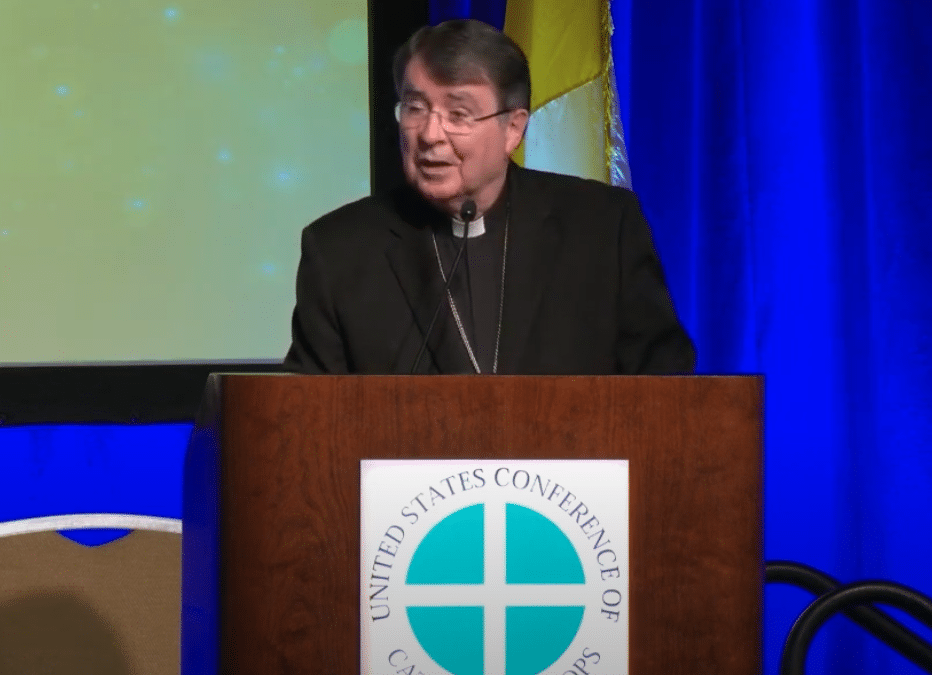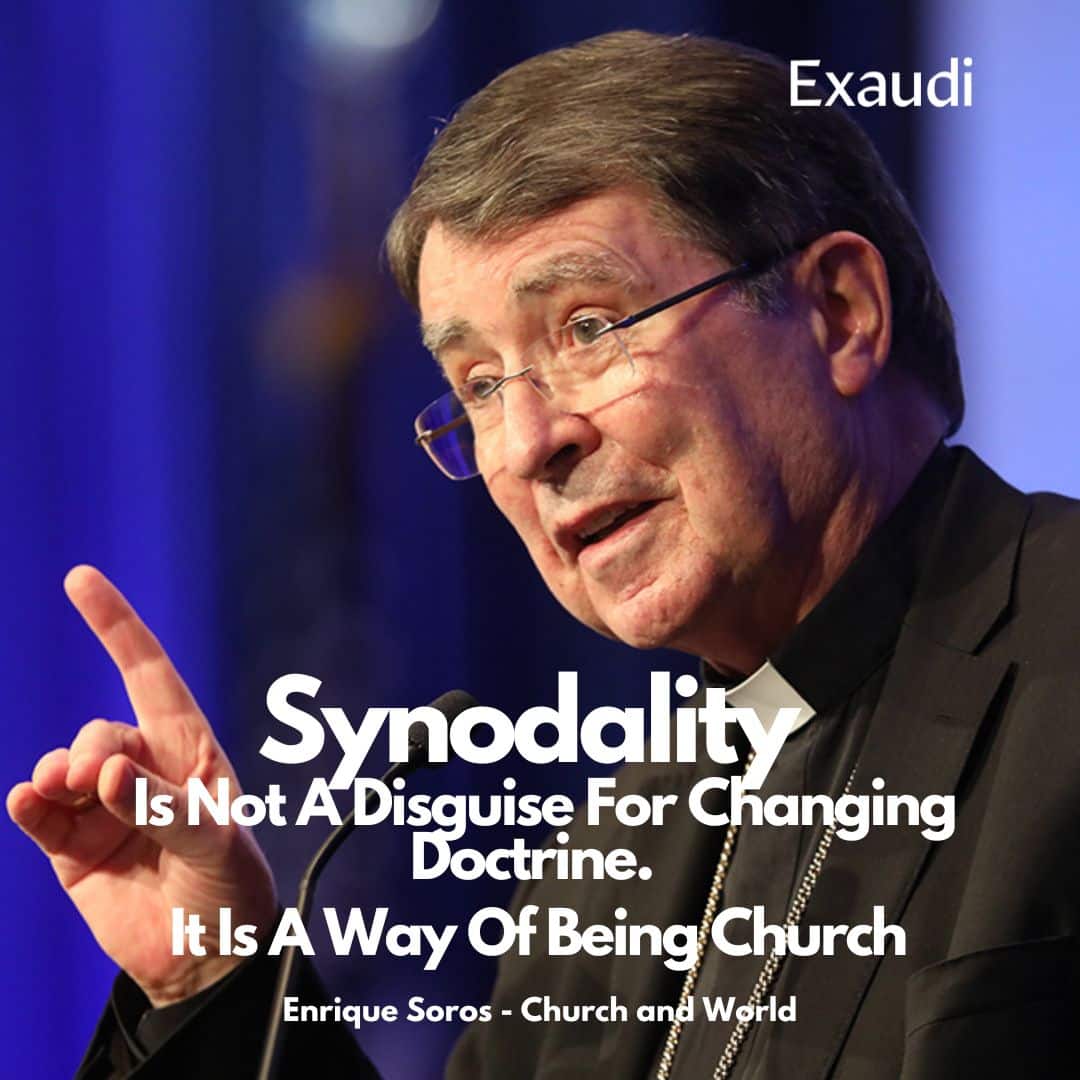A slap on the wrist to U.S. bishops
As if to say: “Brothers, enough of resisting! Don’t you understand?”, in a friendly tone, but without beating around the bush, Nuncio Pierre expressed yesterday before the spring Assembly of the Bishops of the United States in Orlando that, “synodality, we should trust by now, is not a new ‘program’; nor is it a disguise for a plan to change Church doctrine. It is a way of being Church that allows us to discern the path on which the Spirit of God is calling us.”
We are talking about bishops, who one would expect to have it clearer than the faithful. But there are more than a few in the United States who fear that a pastoral attitude of listening and openness to the voice of God in the souls of the people will result in a change in the doctrine of the Church and cause chaos.
How many more times will we have to hear that “synodality is a way of being Church that allows us to discern the path on which the Spirit of God is calling us”, to know that synodality is a way of being Church that allows us to discern the path on which the Spirit of God is calling us?
How can we be Church if we are not clear about the importance of encountering “the Lord and one another, listen to people’s questions and to the religious and existential concerns that lie behind them, and discern with them how we must change in order to live a more abundant life. If we have followed the Pope’s lead, then after two years, we should already know some answers to the questions that you are accustomed to hearing from me: Where are we? and Where are we going?” Nuncio Pierre comments.
Finger on the wound
As a faithful disciple of Pope Francis, the Nuncio aims to get out of the comfort zone, to face the current reality of the Church and the world: ” Have we discovered answers to those questions? Do we know what are the true needs of our people? Through our encounters with others, how have we been changed? What have we discerned? What old ways need to be abandoned, and what new ways must we adopt in going forward?”
Abandon old ways? Were we not doing well in the past? Adopt new ways to move forward? Is it not too risky?
It is not a question of “Francis’ style”, but of “God’s style”
Archbishop Pierre intersperses subtlety with clarity. He is gentle, he does not want to hurt anyone, but he does not renounce to be clear and forceful: “It may be that we are still struggling to understand synodality. Perhaps it has been hard for us to embody this ‘style of God’. Perhaps ‘the adventure of this journey’ has made us a bit fearful of the unknown. As Church leaders, we are very good at organizing programs and carrying out action plans. And no doubt such organization has produced many positive results. But since the synodal journey is less a program and more a way of being Church, it can be a challenge for us.”
A prophetic Church does not need a GPS but a compass
The Nuncio believes that as a Church we cannot allow ourselves to be blindly guided by an automatic program, like a GPS, reducing or overriding personal discernment. He believes that we are called to let ourselves be guided by the Holy Spirit, which requires more effort, but promises abundant fruits. He says that “An image comes to mind which may help illustrate this challenge, and the change of mindset that is required of us. In these days of GPS technology, when we ask, How do we get to where we’re going? we are accustomed to relying on turn-by-turn directions produced by an algorithm. We are told where we are, precisely how far we have to go, and where to turn. But my brothers, our spiritual navigation as Church leaders cannot be based on a computer program. It is less like GPS and more like a compass.”
He continues, “The compass points to where north is. You know the direction you need to take to arrive at your destination; but discerning how to get there requires close attention to your immediate surroundings, which involves patient and careful observation. So too, we as Church know the direction we are going: Jesus Christ and his Kingdom are the “true north”. But to find the proper path, we have to immerse ourselves in the reality of our people and listen carefully to the questions and concerns of their hearts. This is the synodal path; this is the incarnational way of Jesus.”
It is not a matter of imposing, but of going out
Going on mission to the world does not consist in imposing but in being open to listening in one’s personal experience. In the words of the Nuncio: “The Church is a dynamic reality; it is always on the move! Like Christ himself, we must go on mission into the world with an openness to discovering what is actually there – not merely imposing what we already know. This requires close proximity with the one we are encountering. We must move toward, and engage people in the existential places where they are living.”
Another slap on the wrist
Given the strength of ideologies, both in politics and in the Church in the United States, Archbishop Pierre affirms that “extending beyond our current structures and usual ways of doing things, the Kingdom will spread “by contact, by physical presence, not by the propaganda of ideologies. When we engage with people’s real experiences – as ‘messy’ as that reality may be – we give them hope because they realize that Christ is willing to be with them no matter where they are on their journey. If they “come to church” to encounter Christ, it will be because Christ has first come to them. Let us, therefore, be ambassadors for Christ (cf. 2 Cor 5:20)!”
Contribution to the Eucharistic Revival: Living the Eucharist as a Mission
As a contribution to the Eucharistic Congress, under the title of Eucharistic Revival, which will take place in Indianapolis in July 2024, the Nuncio affirms that “this is the point regarding the Eucharist: because it is the real presence of Christ, it is a dynamic Sacrament, imbuing everything we do with the character of Christ’s outgoing love for his people. It is a Sacrament for mission. A Eucharistic revival, therefore, is a call to let the entirety of our lives be an expression of the Lord’s presence among us: a living-out of the union that exists between our humanity, which Christ has taken to himself, and the divinity into which he leads us”.
And he ends the idea by connecting adoration with action: ” To teach the doctrine of the real presence, to promote Eucharistic adoration, and to take our Lord in procession: these initiatives will undoubtedly bear fruit in the lives of the faithful. But the fruit will multiply only if the faithful learn that the Eucharist which they receive is meant to make them missionaries – who take the presence of Christ, which is now in them, to people who do not yet know the Lord”.
Are there walls that used to protect that today are obstacles? Be open to change
Towards the end of his dissertation, Nuncio Pierre affirms that “if we are to love our contemporaries to the end, we must allow Christ’s presence to take us through any walls that block us from delivering peace to his people. If some of these walls were constructed with an understandable desire to protect the integrity of our faith, we must recognize the moment at which those walls are doing more to prevent the spread of the Gospel than to safeguard it. We must be open to change.”
The video with the dissertation of Archbishop Christophe Pierre can be seen here
You can find here the full address of Archbishop Christophe Pierre’s to the U.S. Bishops and other documents of the Assembly of June 2023











